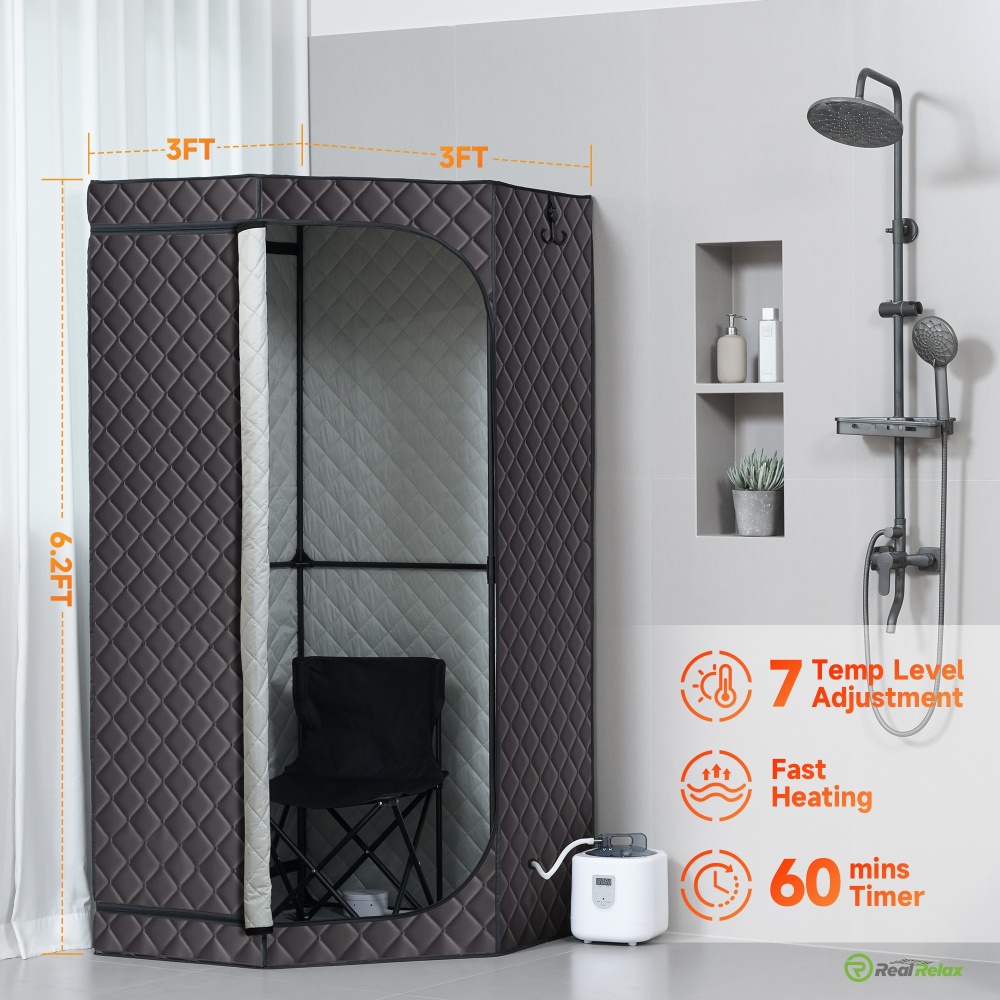
What is an indoor sauna?
An indoor sauna is a personal heat therapy unit installed inside your home, typically using infrared or traditional heating methods.
What types of indoor saunas are available?
The most common types are infrared, traditional (dry heat), and hybrid models that combine both.
How is an indoor sauna different from an outdoor sauna?
Indoor saunas are designed for indoor use, usually smaller and better protected from weather, while outdoor saunas need weatherproof materials.
How much space do I need for an indoor sauna?
A 1-person sauna takes up around 3′ x 3′. Larger models require more room.
Can I install an indoor sauna myself?
Many saunas come in easy-to-assemble kits, but larger ones may require professional installation.
Where in my house can I put an indoor sauna?
Popular spots include basements, bathrooms, spare bedrooms, or even walk-in closets—any well-ventilated, flat-surfaced area.
Do indoor saunas need plumbing?
Nope! Most models don’t need plumbing unless you’re installing a steam sauna.
How do I ventilate an indoor sauna?
Use natural room ventilation, a small fan, or a nearby window. Good airflow helps with moisture control.
Do I need special flooring under an indoor sauna?
Tile, laminate, or concrete works best—avoid carpet or anything moisture-sensitive.
What’s the difference between infrared and traditional indoor saunas?
Infrared uses light to heat your body directly; traditional saunas heat the air and create a steamy atmosphere.
How long does it take an indoor sauna to heat up?
Infrared saunas heat up in 10–20 minutes. Traditional saunas may take 30–45 minutes.
What temperature should an indoor sauna reach?
Infrared: 110–140°F (43–60°C); Traditional: 160–195°F (71–90°C)
How long should a typical session last?
20–40 minutes is standard, depending on the heat and your comfort level.
How often should I use an indoor sauna?
3–5 times a week is common. Some people use it daily for relaxation or muscle recovery.
Is it safe to fall asleep in an indoor sauna?
No—falling asleep in a hot sauna can be dangerous. Always stay alert and hydrated.
Are indoor saunas energy efficient?
Yes! Infrared saunas in particular use less electricity than traditional steam models.
Can I use a sauna if I have a medical condition?
Check with your doctor, especially if you have heart issues, low blood pressure, or are pregnant.
Do indoor saunas help with weight loss?
They can help boost metabolism and burn calories, but they’re most effective when combined with a healthy lifestyle.
What are the health benefits of indoor saunas?
Stress relief, detox, muscle recovery, improved sleep, and better circulation.
Do indoor saunas need a special electrical outlet?
Small models use standard 110V outlets; larger ones might need a 220V connection.
Are indoor saunas loud when operating?
Not really—infrared saunas are quiet. Some traditional models may have low fan or heater sounds.
Can I use essential oils in an indoor sauna?
Yes, but use a safe diffuser or towel—never put oils directly on heaters.
Can multiple people use an indoor sauna at once?
Yes, if the sauna is designed for 2+ users. Choose the right size based on your needs.
Do indoor saunas come with entertainment options?
Many have built-in Bluetooth speakers, reading lights, and chromotherapy lighting.
How do I clean and maintain my indoor sauna?
Wipe it down after use, clean weekly with gentle products, and keep it dry when not in use.
Do indoor saunas create a lot of moisture?
Infrared saunas produce dry heat; traditional saunas may release steam, so ventilation matters.
Can I install a sauna in a rental home or apartment?
Portable or modular units are a great option for renters since they don’t require permanent installation.
What should I wear in an indoor sauna?
A towel, swimsuit, or light workout gear is fine—whatever you’re comfortable in.
Do indoor saunas add value to a home?
Yes, especially if professionally installed and well-maintained.
How much does an indoor sauna cost?
Prices range from $1,000 to $6,000+, depending on size, materials, and features.